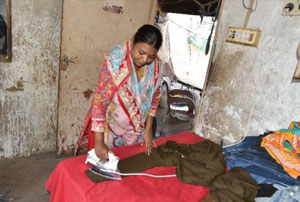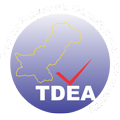Phulana, a 37-year-old mother of five children, is a scheduled caste Hindu who lives in ghettoized Ghera Basti in Hyderabad, Sindh. Her community is discriminated against by Muslims and upper-caste Hindus alike. Abject poverty and a lack of economic opportunities have made their lives considerably hard. Given the hardships, the family resorted to collecting used clothes, upgrading, and selling them. Even this was not sufficient enough for them to make ends meet; they needed help, and luckily for them, it came from a USAID-supported project.
The family needed an iron, a handcart, a washing machine, and sewing machines. Hamdam Foundation, supported by USAID Ambassador’s Fund Grants Program (AFGP), provided the required items along with initiating a three-month training program for 100 people (50 men and 50 women). Phulana was one of the participants who received the training on how best to upcycle secondhand garments.

The training yielded instant dividends as Phulana and her spouse began using the new equipment along with bringing their newly acquired skills into practice. Their income increased significantly. Other trainees also started to benefit in the same fashion.
It was not long ago when Phulana’s spouse Babu went around streets collecting clothes in exchange for new utensils. On the worst of days, he could not even afford to pay the Rs. 600 rent of the handcart. The used clothes were then sent to laundry. Washing and pressing of one suit costed around Rs. 40–60, making the monthly expense soar to Rs. 5,000–Rs. 10,000. High operational costs meant lower profits, resulting in her children often going to bed on empty stomachs.
However, today, Phulana is a happy woman. She has enough money to send three of her children to school. “For the first time, I do not have to worry about the next meal. Our vicious circle of poverty has finally ended,” she says.




















